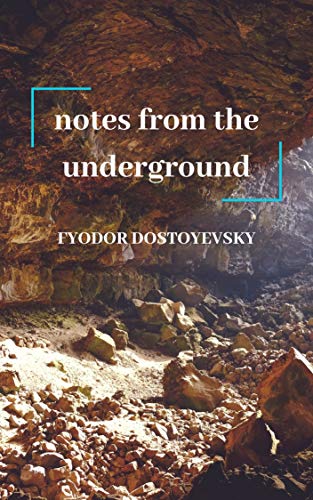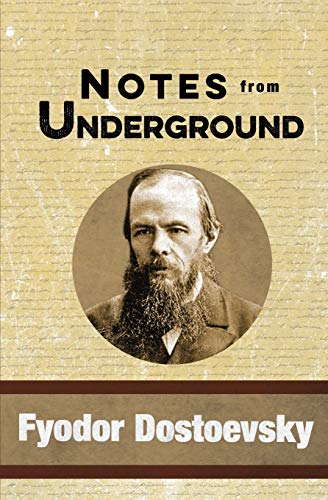-
Notes from the Underground
Fyodor Dostoyevsky
eBook (Dover Publications, March 5, 2012)In 1864, just prior to the years in which he wrote his greatest novels — Crime and Punishment, The Idiot, The Possessed and The Brothers Karamazov — Fyodor Dostoyevsky (1821–1881) penned the darkly fascinating Notes from the Underground. Its nameless hero is a profoundly alienated individual in whose brooding self-analysis there is a search for the true and the good in a world of relative values and few absolutes. Moreover, the novel introduces themes — moral, religious, political and social — that dominated Dostoyevsky's later works. Notes from the Underground, then, aside from its own compelling qualities, offers readers an ideal introduction to the creative imagination, profundity and uncanny psychological penetration of one of the most influential novelists of the nineteenth century. Constance Garnett's authoritative translation is reprinted here, with a new introduction.
-
Notes from Underground
Fyodor Dostoevsky
eBook (Dover Publications, March 5, 2012)Notes from Underground , also translated as Notes from the Underground or Letters from the Underworld, is an 1864 novella by Fyodor Dostoevsky. Notes is considered by many to be one of the first existentialist novels.It presents itself as an excerpt from the rambling memoirs of a bitter, isolated, unnamed narrator (generally referred to by critics as the Underground Man), who is a retired civil servant living in St. Petersburg. The first part of the story is told in monologue form, or the underground man's diary, and attacks emerging Western philosophy, especially Nikolay Chernyshevsky's What Is to Be Done? The second part of the book is called "Apropos of the Wet Snow" and describes certain events that appear to be destroying and sometimes renewing the underground man, who acts as a first person, unreliable narrator and anti-hero.
-
Notes from Underground
Fyodor Dostoevsky
Paperback (SDE Classics, Sept. 12, 2019)I say, in earnest, that I should probably have been able to discover even in that a peculiar sort of enjoyment—the enjoyment, of course, of despair; but in despair there are the most intense enjoyments, especially when one is very acutely conscious of the hopelessness of one’s position.From Dostoevsky’s earliest novel, follow the complicated mind of a retired civil servant living in St. Petersburg, Russia, in the mid 19th century. The ramblings of the unnamed narrator run the gamut from human morality, to logic and reason, to an unattainable human utopia. A great introduction to Dostoevsky, Notes from Underground brilliantly precedes his lengthier later novels, such as Crime and Punishment.
-
Notes from Underground
Fyodor Dostoevsky
eBook (Dover Publications, March 28, 2020)Notes from Underground , also translated as Notes from the Underground or Letters from the Underworld, is an 1864 novella by Fyodor Dostoevsky. Notes is considered by many to be one of the first existentialist novels.It presents itself as an excerpt from the rambling memoirs of a bitter, isolated, unnamed narrator (generally referred to by critics as the Underground Man), who is a retired civil servant living in St. Petersburg. The first part of the story is told in monologue form, or the underground man's diary, and attacks emerging Western philosophy, especially Nikolay Chernyshevsky's What Is to Be Done? The second part of the book is called "Apropos of the Wet Snow" and describes certain events that appear to be destroying and sometimes renewing the underground man, who acts as a first person, unreliable narrator and anti-hero.
-
Notes from the Underground
Fyodor Dostoevsky
eBook (Dover Publications, May 25, 2020)Notes from the Underground or Letters from the Underworld, is an 1864 novella by Fyodor Dostoevsky. Notes is considered by many to be one of the first existentialist novels.It presents itself as an excerpt from the rambling memoirs of a bitter, isolated, unnamed narrator (generally referred to by critics as the Underground Man), who is a retired civil servant living in St. Petersburg. The first part of the story is told in monologue form, or the underground man's diary, and attacks emerging Western philosophy, especially Nikolay Chernyshevsky's What Is to Be Done? The second part of the book is called "Apropos of the Wet Snow" and describes certain events that appear to be destroying and sometimes renewing the underground man, who acts as a first person, unreliable narrator and anti-hero.
-
Notes from the Underground
Feodor Dostoevsky
eBook (Dover Publications, June 21, 2020)Dostoevsky’s most revolutionary novel, Notes from Underground marks the dividing line between nineteenth- and twentieth-century fiction, and between the visions of self each century embodied. One of the most remarkable characters in literature, the unnamed narrator is a former official who has defiantly withdrawn into an underground existence. In full retreat from society, he scrawls a passionate, obsessive, self-contradictory narrative that serves as a devastating attack on social utopianism and an assertion of man’s essentially irrational nature.Richard Pevear and Larissa Volokhonsky, whose Dostoevsky translations have become the standard, give us a brilliantly faithful edition of this classic novel, conveying all the tragedy and tormented comedy of the original.
-
Notes from Underground
Fyodor Dostoevsky
eBook (Dover Publications, March 5, 2012)Notes from Underground , also translated as Notes from the Underground or Letters from the Underworld, is an 1864 novella by Fyodor Dostoevsky. Notes is considered by many to be one of the first existentialist novels.It presents itself as an excerpt from the rambling memoirs of a bitter, isolated, unnamed narrator (generally referred to by critics as the Underground Man), who is a retired civil servant living in St. Petersburg. The first part of the story is told in monologue form, or the underground man's diary, and attacks emerging Western philosophy, especially Nikolay Chernyshevsky's What Is to Be Done? The second part of the book is called "Apropos of the Wet Snow" and describes certain events that appear to be destroying and sometimes renewing the underground man, who acts as a first person, unreliable narrator and anti-hero.
-
Notes from Underground
Fyodor Dostoevsky
eBook (Dover Publications, March 24, 2020)Notes from Underground , also translated as Notes from the Underground or Letters from the Underworld, is an 1864 novella by Fyodor Dostoevsky. Notes is considered by many to be one of the first existentialist novels.It presents itself as an excerpt from the rambling memoirs of a bitter, isolated, unnamed narrator (generally referred to by critics as the Underground Man), who is a retired civil servant living in St. Petersburg. The first part of the story is told in monologue form, or the underground man's diary, and attacks emerging Western philosophy, especially Nikolay Chernyshevsky's What Is to Be Done? The second part of the book is called "Apropos of the Wet Snow" and describes certain events that appear to be destroying and sometimes renewing the underground man, who acts as a first person, unreliable narrator and anti-hero.
-
Notes from Underground
Fyodor Dostoevsky
eBook (Dover Publications, May 3, 2020)Notes from Underground (pre-reform Russian: Записки изъ подполья; post-reform Russian: Записки из подполья, tr. Zapíski iz podpólʹya), also translated as Notes from the Underground or Letters from the Underworld, is an 1864 novella by Fyodor Dostoevsky. Notes is considered by many to be one of the first existentialist novels.[1] It presents itself as an excerpt from the rambling memoirs of a bitter, isolated, unnamed narrator (generally referred to by critics as the Underground Man), who is a retired civil servant living in St. Petersburg. The first part of the story is told in monologue form, or the underground man's diary, and attacks emerging Western philosophy, especially Nikolay Chernyshevsky's What Is to Be Done?[2] The second part of the book is called "Apropos of the Wet Snow" and describes certain events that appear to be destroying and sometimes renewing the underground man, who acts as a first person, unreliable narrator and anti-hero.[3]
-
Notes from Underground
Fyodor Dostoevsky
eBook (Dover Publications, March 26, 2020)Notes from Underground , also translated as Notes from the Underground or Letters from the Underworld, is an 1864 novella by Fyodor Dostoevsky. Notes is considered by many to be one of the first existentialist novels.It presents itself as an excerpt from the rambling memoirs of a bitter, isolated, unnamed narrator (generally referred to by critics as the Underground Man), who is a retired civil servant living in St. Petersburg. The first part of the story is told in monologue form, or the underground man's diary, and attacks emerging Western philosophy, especially Nikolay Chernyshevsky's What Is to Be Done? The second part of the book is called "Apropos of the Wet Snow" and describes certain events that appear to be destroying and sometimes renewing the underground man, who acts as a first person, unreliable narrator and anti-hero.
-
Notes from the Underground
Fyodor Dostoyevsky
eBook (Dover Publications, March 5, 2012)In 1864, just prior to the years in which he wrote his greatest novels — Crime and Punishment, The Idiot, The Possessed and The Brothers Karamazov — Fyodor Dostoyevsky (1821–1881) penned the darkly fascinating Notes from the Underground. Its nameless hero is a profoundly alienated individual in whose brooding self-analysis there is a search for the true and the good in a world of relative values and few absolutes. Moreover, the novel introduces themes — moral, religious, political and social — that dominated Dostoyevsky's later works. Notes from the Underground, then, aside from its own compelling qualities, offers readers an ideal introduction to the creative imagination, profundity and uncanny psychological penetration of one of the most influential novelists of the nineteenth century. Constance Garnett's authoritative translation is reprinted here, with a new introduction.
-
Notes from the Underground
Fyodor Dostoyevsky
eBook (Dover Publications, March 5, 2012)In 1864, just prior to the years in which he wrote his greatest novels — Crime and Punishment, The Idiot, The Possessed and The Brothers Karamazov — Fyodor Dostoyevsky (1821–1881) penned the darkly fascinating Notes from the Underground. Its nameless hero is a profoundly alienated individual in whose brooding self-analysis there is a search for the true and the good in a world of relative values and few absolutes. Moreover, the novel introduces themes — moral, religious, political and social — that dominated Dostoyevsky's later works. Notes from the Underground, then, aside from its own compelling qualities, offers readers an ideal introduction to the creative imagination, profundity and uncanny psychological penetration of one of the most influential novelists of the nineteenth century. Constance Garnett's authoritative translation is reprinted here, with a new introduction.